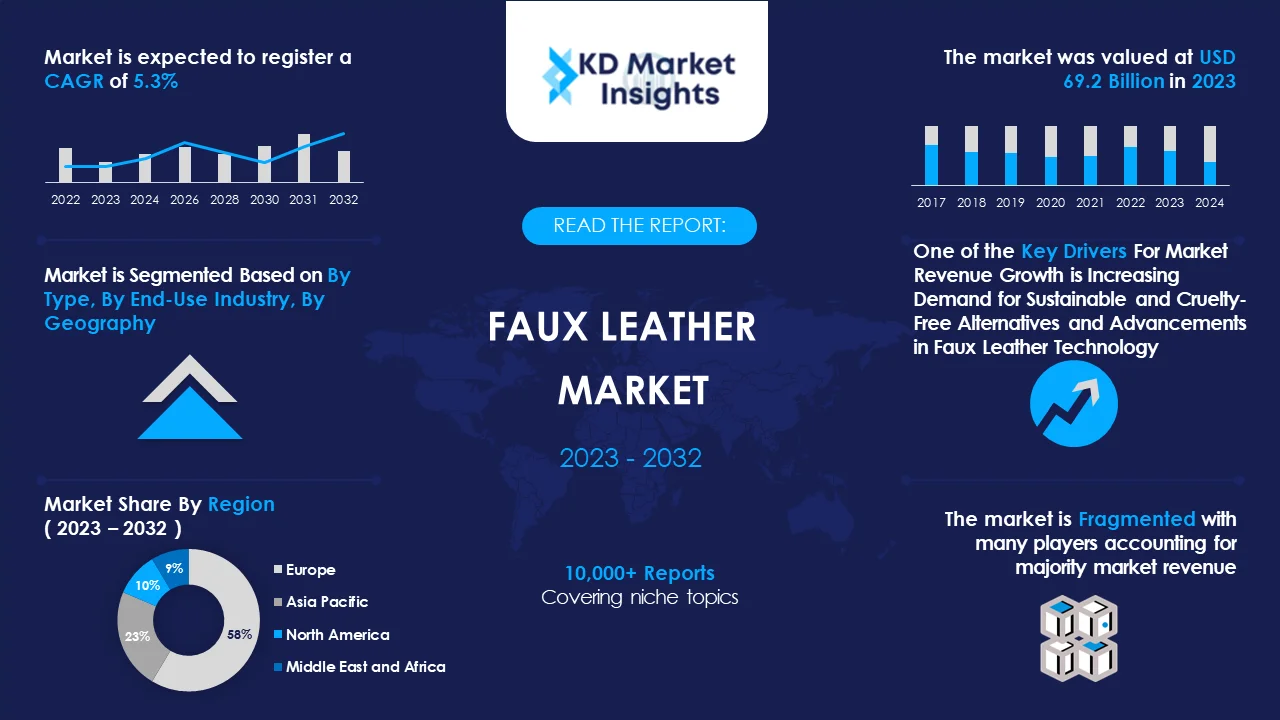Faux Leather Market is segmented By Type (PU-based, PVC-based, Bio-based); By End-Use Industry (Footwear, Furnishing, Automotive, Clothing, Bags, Purses & Wallets); By Region (North America, Europe, Asia Pacific, Latin America, Middle East & Africa) - Global Market Analysis, Trends, Opportunity and Forecast, 2023-2032
Faux Leather Market Overview
The global faux leather market was valued at USD 69.2 billion in 2023. The market is expected to expand at a CAGR of 5.3% from 2023-2032, and is expected to cross value of USD 92.3 billion by the end of 2032.
Faux leather, also known as synthetic leather, imitation leather, or artificial leather, is a man-made material that mimics the appearance and, to some extent, the feel of genuine leather. It is designed to replicate the look and texture of real leather while often offering advantages in terms of cost, durability, and ethical considerations. The primary growth factor associated with the faux leather market is the increasing demand for sustainable and cruelty-free alternatives to natural leather. Kuraray Co., Ltd., Toray Industries, Inc., and Teijin Limited are some of the significant parties in the market for faux leather.
 Get More Insights on This Report - Request Free Sample PDF
Get More Insights on This Report - Request Free Sample PDF
Faux Leather Market Drivers
Some key drivers for the faux leather market are:
- Increasing Demand for Sustainable and Cruelty-Free Alternatives: The faux leather market is driven by the rising demand for sustainable and cruelty-free alternatives to natural leather. Consumers and industries are increasingly conscious of environmental and ethical considerations, leading to a preference for faux leather as a more sustainable option.
- Advancements in Faux Leather Technology: Ongoing advancements in technology and manufacturing processes have led to improvements in the quality, texture, and appearance of faux leather. Innovations in creating synthetic materials that closely mimic the look and feel of genuine leather contribute to the market's growth by expanding its applications.
- Growing Popularity of Synthetic Leather in Fashion and Apparel Industry: Faux leather has gained significant popularity in the fashion and apparel industry due to its versatility and the ability to replicate the aesthetic of real leather. Designers and brands increasingly incorporate faux leather into their collections, driving demand in the fashion sector.
- Expanding Applications of Faux Leather in Various Industries: Faux leather is versatile and applicable across various industries, including automotive, furniture, interior design, and accessories. The flexibility of faux leather in terms of design, colors, and textures, coupled with its cost-effectiveness, contributes to its adoption in diverse applications, thereby driving market growth.
Faux Leather Market Challenges
Some challenges facing the faux leather market are:
- Perceived Quality and Durability Concerns: Some consumers may still perceive faux leather as having lower quality or durability compared to genuine leather. Addressing these concerns and ensuring that faux leather products meet high-quality standards is crucial for wider market acceptance.
- Environmental Impact of Synthetic Materials: While faux leather is considered more environmentally friendly than traditional leather in some aspects, the production of synthetic materials still involves chemicals and energy-intensive processes. Concerns about the environmental impact of these processes, including issues related to waste disposal and recycling, can act as a restraint for certain environmentally conscious consumers.
- Limited Biodegradability: Faux leather materials, often made from synthetic polymers, may have limited biodegradability compared to natural materials. As sustainability becomes a more significant factor in purchasing decisions, the limited biodegradability of faux leather could be viewed as a drawback, especially when compared to certain eco-friendly alternatives.
Faux Leather Market Segmentation
Segmentation of faux leather market are:
- By Type
- PU-based
- PVC-based
- Bio-based
- By End-Use Industry
- Footwear
- Furnishing
- Automotive
- Clothing
- Bags
- Purses & Wallets
- By Region
- North America (U.S., and Canada)
- Europe (U.K., Germany, France, Italy, Spain, Russia, Rest of Europe)
- Asia-Pacific (Japan, China, India, Indonesia, Malaysia, Australia, Rest of Asia-Pacific)
- Latin America (Mexico, Argentina, Rest of Latin America)
- Middle East and Africa
Faux Leather Market: Report Scope |
|
|
Base Year |
2023 |
|
Base Year Market Size |
USD 69.2 Billion |
|
Forecast Year |
2023-2032 |
|
Forecast Year Market Size |
USD 92.3 Billion |
|
CAGR Value |
5.3% |
|
Segmentation |
|
|
Challenges |
|
|
Growth Drivers |
|
Timeline considered for all these studies will be:
2023 – Base Year
2023 – Estimated Year
2023-2032 – Forecast Period
Faux Leather Market Regional Synopsis
The rising demand for sustainable alternatives is one of the major factor expected to drive the growth of the faux leather market in Europe. The region has a strong emphasis on sustainability and environmental responsibility. The growing awareness of the ecological impact of traditional leather production has led to an increased demand for sustainable alternatives, including faux leather. On the other hand, Europe has stringent regulations on animal welfare, and concerns about ethical treatment of animals have led to a shift toward cruelty-free alternatives. Faux leather, being animal-free, aligns with these regulations and ethical considerations, driving its adoption in the European market.
Alternatively, the Asia Pacific region is experiencing significant economic growth, leading to rising disposable income and an expanding middle-class population. As consumers have more purchasing power, the demand for fashionable and affordable products, including those made from faux leather, is on the rise.
Faux Leather Market Key Players
Some key players in the faux leather market are:
- Kuraray Co., Ltd.
- Toray Industries, Inc.
- Teijin Limited
- E. I. du Pont de Nemours and Company (DuPont)
- Mayur Uniquoters Ltd.
- Nan Ya Plastics Corporation
- Filwel Co., Ltd.
- Benecke-Kaliko AG
- Mehler Texnologies GmbH
- Vegan Leather Ltd.
- EcoDomo LLC
- Ultrasuede (Toray Industries)

Need Customized Report for Your Business ?
Utilize the Power of Customized Research Aligned with Your Business Goals
Request for Customized Report- Quick Contact -
- ISO Certified Logo -

















